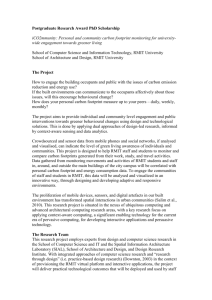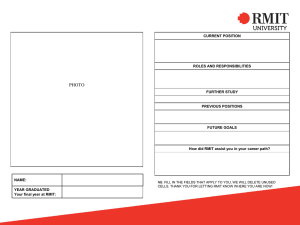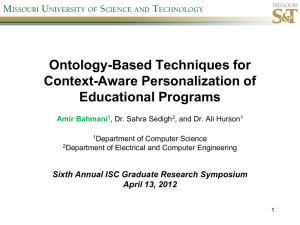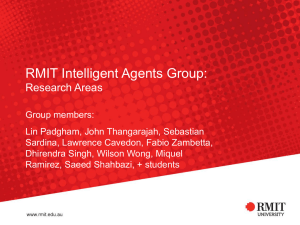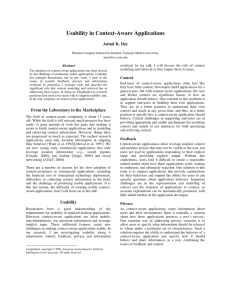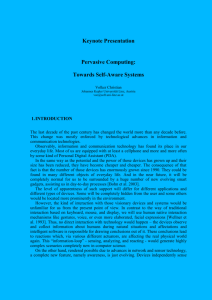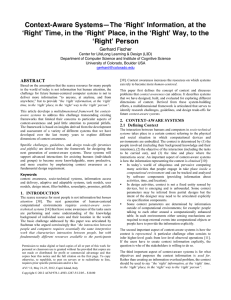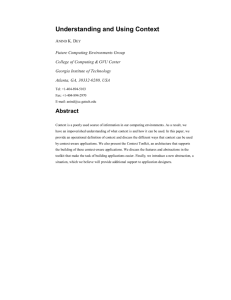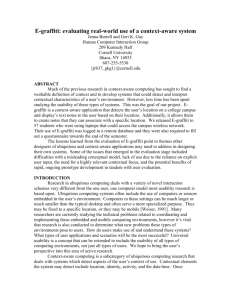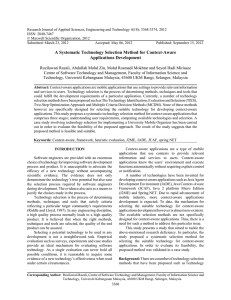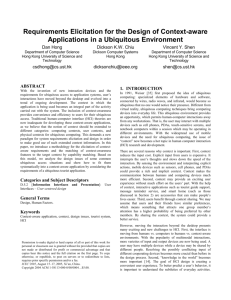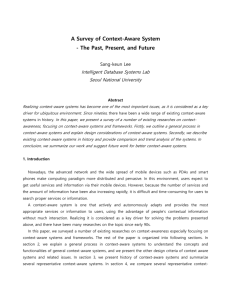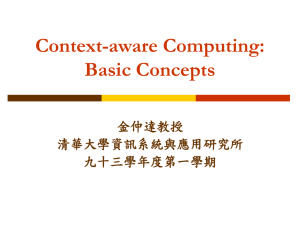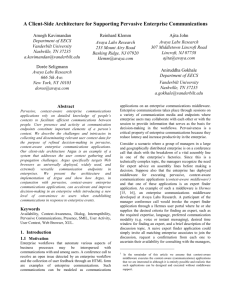Context-aware activity and movement monitoring for university
advertisement
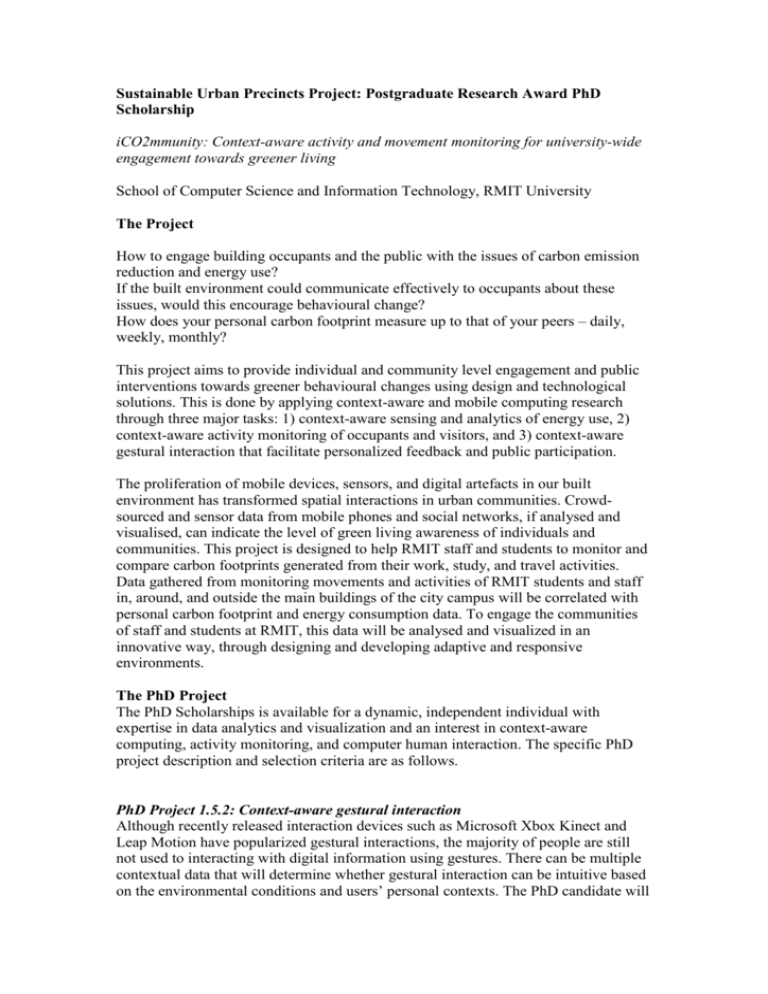
Sustainable Urban Precincts Project: Postgraduate Research Award PhD Scholarship iCO2mmunity: Context-aware activity and movement monitoring for university-wide engagement towards greener living School of Computer Science and Information Technology, RMIT University The Project How to engage building occupants and the public with the issues of carbon emission reduction and energy use? If the built environment could communicate effectively to occupants about these issues, would this encourage behavioural change? How does your personal carbon footprint measure up to that of your peers – daily, weekly, monthly? This project aims to provide individual and community level engagement and public interventions towards greener behavioural changes using design and technological solutions. This is done by applying context-aware and mobile computing research through three major tasks: 1) context-aware sensing and analytics of energy use, 2) context-aware activity monitoring of occupants and visitors, and 3) context-aware gestural interaction that facilitate personalized feedback and public participation. The proliferation of mobile devices, sensors, and digital artefacts in our built environment has transformed spatial interactions in urban communities. Crowdsourced and sensor data from mobile phones and social networks, if analysed and visualised, can indicate the level of green living awareness of individuals and communities. This project is designed to help RMIT staff and students to monitor and compare carbon footprints generated from their work, study, and travel activities. Data gathered from monitoring movements and activities of RMIT students and staff in, around, and outside the main buildings of the city campus will be correlated with personal carbon footprint and energy consumption data. To engage the communities of staff and students at RMIT, this data will be analysed and visualized in an innovative way, through designing and developing adaptive and responsive environments. The PhD Project The PhD Scholarships is available for a dynamic, independent individual with expertise in data analytics and visualization and an interest in context-aware computing, activity monitoring, and computer human interaction. The specific PhD project description and selection criteria are as follows. PhD Project 1.5.2: Context-aware gestural interaction Although recently released interaction devices such as Microsoft Xbox Kinect and Leap Motion have popularized gestural interactions, the majority of people are still not used to interacting with digital information using gestures. There can be multiple contextual data that will determine whether gestural interaction can be intuitive based on the environmental conditions and users’ personal contexts. The PhD candidate will analyze contextual data regarding and around the users before, during, and after each interaction, inferred from sensors and vision based system, to establish a generic and adaptive context-aware model and system for interacting with information using gestures in various cases. Two case studies will be observed. The first is contextaware gestural interaction models that engage the public to participate and interact with public displays (screens) using their gestures. The scenario for the first case is for green living. In this case, information and visualization from 2 other SUPP PhD Projects will be used on public displays for the model to be evaluated. The second case study is context-aware and gestural interaction models for individuals, personalized for different types of users in different contexts, such as while driving. The effectiveness of the gestural interaction system will also be evaluated. The PhD candidate will have a background in Computer Science, with strong programming skills and a good understanding of interaction design or data modelling. Experiences with vision-based processing and sensor data analytics are preferable. Selection Criteria The successful applicant should: • Demonstrate excellent undergraduate academic performance in a field related to the proposed research. • Have completed a Masters degree or Honours degree (with a minor thesis or research component) with distinction. • Have demonstrated research excellence in the field related to the proposed research through a relevant publication track-record resulting from their previous thesis work. • Demonstrate the ability to organise and work independently as well as part of a team. What does the scholarship provide? • Tax-free stipend of $30,000 per annum over 3.5 years and an RTS place for Australian citizens or permanent residents in a doctoral degree within the School of Computer Science and Information Technology. A fee waiver may be available for outstanding international applicants. • Applicants should discuss their eligibility with project leader Dr Flora Salim from the School of CS & IT before applying: flora.salim@rmit.edu.au, phone +61 3 9925 4572 http://florasalim.com The Research Team This research project involves experts from design and computer science research in the School of Computer Science and IT, and the Spatial Information Architecture Laboratory (SIAL), and Design Research Institute. The chief investigators of the project are Dr. Flora Salim, Dr. Margaret Hamilton, and Dr. Jane Burry. The project will deliver practical technological outcomes that will be deployed and used by staff and students to increase self- and community- awareness of green living behaviours. Successful candidates will be supervised by Dr. Flora Salim. Dr. Flora Salim is a Research Fellow at the School of Computer Science and Information Technology, RMIT University. Her expertise is primarily in the area of context-aware computing, data modelling and analysis, and intelligent systems with application areas in intelligent transportation systems, adaptive architecture, and smart cities. She received her PhD in Computer Science from Monash University in 2009. She has published at least 45 international peer-reviewed articles in significant conferences, journals, and book chapters. She is a member of the team who secured an ARC Linkage grant on integrating real-time public transport data. She has secured other internal and external grants to the total value of over than $1million in the last four years of her postdoctoral research, including the IBM Smarter Planet Industry Skills Innovation Award 2010, the RMIT Ian Permezel Memorial Award 2010. This project is funded by the RMIT Sustainable Urban Precincts Project (SUPP)
